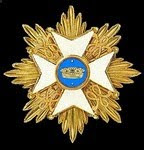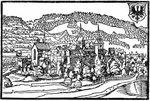This was a fusilier regiment, first raised 1743. Chef to 1757 was Colonel Carl Eugen, Hereditary Prince of Württemberg, later Lieutenant General and reigning Duke. In 1756 the actual field commander was Colonel Christian Ludwig von Pfuel, later Major General. He was replaced on 18th November 1756 by Major General Emanuel von Schöning, who died on the 16th May 1757 of wounds received at the battle of Prague. His successor in May 1757 was Colonel Johann Albrecht von Bülow, who had been chef since the 26th December 1756 and was later a Lieutenant General.
In 1756 IR46 was mobilised to join the Prussian Corps in Pomerania as a reserve unit. It moved to Lusatia on December 7th. It was one of the units not enlarged on January 9th 1757 but remained at its original strength of 1320 men. At Prague on May 6th the 1st Battalion was on the left flank, the 2nd Battalion part of the force that surrounded the city; both battalions suffered heavy losses. (Duffy Army of Frederick the Great 1st Edition (henceforth AFG1)) gives the losses of the 2nd battalion as around 50% and the grenadier battalion 8/46 as 25%.) On July 15th the 2nd Battalion and the grenadiers were captured after the fall of Gabel. From mid-August the 1st Battalion marched to Silesia with the Duke of Bevern and was at the defeat of Breslau on the 22nd November. Joining the King at Parchwitz, the 1st Battalion fought at Leuthen as part of the second line of the right wing under General Bülow. Losses were around 15% (AFG1).
In 1758 the prisoners were exchanged and those who had not deserted returned to the regiment. From late March to April 16th the regiment participated in the siege of Schweidnitz, then from the beginning of May was at the abortive siege of Olmütz with the grenadiers, retreating to Silesia with the army after the debacle of Domstadtl. At Zorndorf on August 25th the regiment was on the right of Kanitz's left wing of the army which veered to the right and was only saved by an attack on the Russians by Seydlitz's cavalry wing; in this very bloody battle the regiment lost around 25% and the grenadiers (8/46) 30% (AFG1). When the left wing fell back the King tried to rally them with a regimental flag and his drawn sword. Under Wedell on September 28th the regiment was part of the force that took Fehrbellin from the Swedes to protect Berlin. The grenadiers were at the defeat of Hochkirch on the 14th October and lost 40% of their numbers (AFG1).
In 1759 it was part of Prince Heinrich's Corps that advanced into Franconia to June. Marching to Kunersdorf on 31st July, in the battle there of 12th August it suffered heavy losses (more than 35% (AFG1)) attacking the Grosser Spitzberg.
On June 23rd 1760 IR46 fought heroically to the bitter end at Fouqué's defeat at Landeshut; few survived to escape and now no prisoners were being exchanged. (There is an excellent detailed account of the battle in Duffy, By Force of Arms.) In 1761 and 1762 the remains of the regiment were stationed in Breslau and participated in the siege of Schweidnitz. At the end of the war in 1763 the regiment was filled up with the survivors of the Heer Free Battalion, who were largely Swiss deserters from the French army.
And this is the fusilier uniform in 1756:




















Wonderful stuff, David. You did a lovely job on the flag, and the straw and black really compliments the unit’s uniform. Your website is certainly a “go to” destination, and each new posting is highly anticipated.
ReplyDeleteThank you for sharing.
Bill
Thanks very much, Bill. It is rather an attractive flag, isn't it? It's worth continuing to post as often as I can when people enjoy the flags and uniforms. :-)
ReplyDeleteThe next flags will be those of IR10; not so fancy nor so colourful (although the history has exciting moments, such as helping the Garde to storm the churchyard at Leuthen!) but if I do all the more attractive ones first I'll have to finish with a monotonous swathe of the not so appealing flags! Probably not a good strategy... ;-)
All the best,
David.
Another nice flag with an elegant simplicity to it. I was going to call it cream but I think straw sounds better! I hope you keep publishing these flags as they are wonderful and the potted history of the units is great too:)
ReplyDeleteThanks, Steve. Glad you like them - and the text, which (as I have said ad nauseam) takes me far longer to produce than the flags. ;-) Yes, I shall continue with the Prussian flags - eventually I hope to do them all, as they are relatively limited in number (far fewer than there are French flags!). Doing them "battle by battle" gives a certain shape to the project too and gives me smaller manageable batches to do.
ReplyDeleteAll the best,
David.